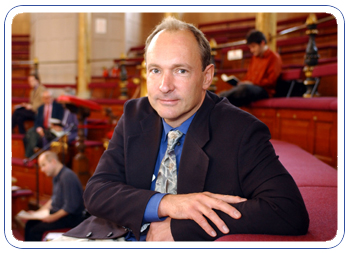

















Title: The Two Magics of Web Science
Abstract:
Web Science, of course, is largely engineering, as is computer science. But Web Science is different. When you design a new Web technology, it involves both technical protocols and social conventions. These work together to produce the new system, a computer-mediated interaction between two people. The first magic (process we don't understand) is when that interaction between two people scales to produce a new macroscopic phenomenon. The link between the microscopic and the macroscopic is fascinating. When we look at our macroscopic world and sigh, and wish it were better, it then takes a creative magic to see what new microscopic design could have the right effect. The creative leap of many neurons, and the collaboration of many people are the most exciting parts of the whole process, and what the Web has been about from day one.
Biographical Information:
A graduate of Oxford University, England, Tim Berners-Lee holds the 3Com Founders chair and is a Senior Research Scientist at the Laboratory for Computer Science and Artificial Intelligence (CSAIL) at the Massachusetts Institute of Technology (MIT). He is co-Director of the new Web Science Research Initiative (WSRI) and is a Chair in the Computer Science Department at the University of Southampton, UK. He is the Director of the World Wide Web Consortium (W3C), founded in 1994.
In 1989 he invented the World Wide Web, an internet-based hypermedia initiative for global information sharing while at CERN, the European Particle Physics Laboratory. He wrote the first web client and server in 1990. His specifications of URIs, HTTP and HTML were refined as Web technology spread.
Over the years, Tim has received many international awards, including The MacArthur Foundation "Genius" Grant, Japan Prize, the Prince of Asturias Foundation Prize, the Millennium Technology Prize , and Germany's Die Quadriga Award. In 2001 he became a fellow of the Royal Society. Widely recognized as one of the greatest visionaries of our time, Tim Berners-Lee was given the rank of Knight Commander (the second-highest rank in the Order of the British Empire) by Queen Elizabeth II on July 16, 2004. He is the recipient of the 2007 Charles Stark Draper Prize, given by the National Academy of Engineering (US).
